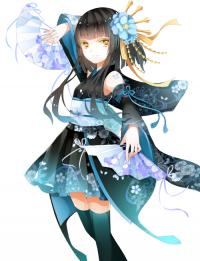Edited by ⚡lightning07⚡, 09 April 2014 - 10:50 PM.

What counts as "Tragedy"?
#1

 Posted 09 April 2014 - 10:48 PM
Posted 09 April 2014 - 10:48 PM

#2

 Posted 09 April 2014 - 11:24 PM
Posted 09 April 2014 - 11:24 PM

I generally define it in two ways:
1. The original definition of Tragedy (of which Shakespeare's plays followed) and
2. Any event that both changes the life of a character and/or elicits strong emotions from the reader
1) In this way, a character simply saying that "Joe's mother died in a car crash" isn't very tragic (and thus wouldn't warrant the tag), but if such a thing happened DURING the run of the series (like 20 chapters in) and wasn't a flashback, that could be counted as a tragedy.
2) In such a way, it could be only one character that dies, but it is an emotional death that changes characters.
Edited by Naizumi, 10 April 2014 - 12:14 AM.
minor edit~ with the #s
My words are my own, and do not represent Batoto in any way, shape, or form unless otherwise stated in the post itself ^.^
#3

 Posted 10 April 2014 - 12:07 AM
Posted 10 April 2014 - 12:07 AM

Moved to Comic Hosting~
ןן Tea Party~ ןן "THE BAR" ןן
ןןGuide to Uploading/deltin/sortin ןן
ןן[Must read] COMMENT SECTIONS RULES ן
Follow the comment sections' rules or else, you will be hanging at the edge of an cliff ^^It maybe one step closer to death's door or an extension of your life's time.
#4

 Posted 10 April 2014 - 01:23 AM
Posted 10 April 2014 - 01:23 AM

When people tag a manga as a "tragedy," they are doing it based on the every day definition of it. A "tragedy" is something that causes great suffering, destruction, or distress. However, considering that manga can be considered "literature," it should follow the definition of a "tragedy" in literature. In which case, the definition for that is when tragic events lead to an unhappy ending and the downfall of the main character. Yet, most manga "tragedies" that I've read have a relatively happy ending and there is no downfall of the main character. Also, the point of the tragedy main character's downfall. For example, Oedipus marrying is mother, thus causing him to gouge out his own eyes. Or Romeo becoming exiled, believing that Juliet is dead, which he then drinks poison, and then you know the rest. Or Beowulf fighting the dragon alone and he ends up getting killed. So, pretty much most of the manga that probably have the "tragedy" tag are not true tragedies at all.
Edited by November Rose, 10 April 2014 - 01:24 AM.
#5

 Posted 10 April 2014 - 01:34 AM
Posted 10 April 2014 - 01:34 AM

#6

 Posted 10 April 2014 - 02:39 AM
Posted 10 April 2014 - 02:39 AM

@Lightning: That is basically where the problem lies. Very few tragedies end on a happy note. For example, Shakespeare's King Richard III. It's one of his historical plays, yes, but it is also consider a tragedy. King Richard ends killing everyone who stands in the way of what he wants, which ends up leading him to go insane, and he is eventually killed. Most tragedies would end with the death of the main character, with a few final words of course, and that would be it. However, for this particular play, it ends on a happy note because it ends with a wedding... well, a wedding arrangement.
Other than a few exceptions, a tragedy follows a formula. Usually, something good happens to the character in the beginning; however, after that good event, it goes downhill with the character going through tragic events which, in most cases, ends up leading to their death.
Romeo and Juliet: Romeo and Juliet meet each other and fall in love. There is a fight that ends up with Mercutio and Tybalt dead and Romeo getting exiled. Juliet pretends to be dead, but Romeo does not get the message that she is not. He drinks poison and dies as Juliet is waking up. Juliet kills herself because Romeo is dead. The families weep over the lovers dead bodies and say the closing part of the play.
Macbeth: Macbeth finds out he is going to be king from the witches. His wife, Lady Macbeth, convinces Macbeth should murder the king. Macbeth murders the king. He murders his friend, Banquo, and attempts to murder Banquo's son so he can remain king. Macbeth ends up seeing Banquo's ghost and slowly goes insane. Lady Macbeth eventually goes insane and kills herself. McDuff, who wants to get revenge on Macbeth, starts a rebellion. McDuff and Macbeth fight, ending with Macbeth getting killed.
The Scarlet Letter: Hester receives word that her husband is dead. She has an affair with the minister of the village/town, Reverend Dimmesdale. She ends up pregnant, which makes her have to wear a scarlet "A" to show she is an adulterer. Hester lives in isolation with her daughter, Pearl. Hester's husband is alive and he plans on seeking revenge. Reverend Dimmesdale dies after confessing his sin of sleeping with Hester. Hester dies at the end of the book (she was an old woman).
As you see, they all follow a similar formula. I've yet to read a manga that follows this exact formula that isn't already based on a tragedy like Romeo and Juliet. For example, Basara is labeled as a "tragedy." But it's not. Yes, tragic events do happen; however, neither one of the characters fall from grace. Meaning, neither Sarasa nor Shuri end up going through these tragic events that end up leading to their death because of morally wrong deeds (even though not all tragedies end with the death of the main character(s), they do not have a happy ending). Yes, Shuri loses his arm, but in the end, he and Sarasa are together and happy.
Edited by November Rose, 10 April 2014 - 02:41 AM.
#7

 Posted 10 April 2014 - 02:44 AM
Posted 10 April 2014 - 02:44 AM

#8

 Posted 10 April 2014 - 03:05 AM
Posted 10 April 2014 - 03:05 AM

@Lightning: That is basically where the problem lies. Very few tragedies end on a happy note. For example, Shakespeare's King Richard III. It's one of his historical plays, yes, but it is also consider a tragedy. King Richard ends killing everyone who stands in the way of what he wants, which ends up leading him to go insane, and he is eventually killed. Most tragedies would end with the death of the main character, with a few final words of course, and that would be it. However, for this particular play, it ends on a happy note because it ends with a wedding... well, a wedding arrangement.
Other than a few exceptions, a tragedy follows a formula. Usually, something good happens to the character in the beginning; however, after that good event, it goes downhill with the character going through tragic events which, in most cases, ends up leading to their death.
Romeo and Juliet: Romeo and Juliet meet each other and fall in love. There is a fight that ends up with Mercutio and Tybalt dead and Romeo getting exiled. Juliet pretends to be dead, but Romeo does not get the message that she is not. He drinks poison and dies as Juliet is waking up. Juliet kills herself because Romeo is dead. The families weep over the lovers dead bodies and say the closing part of the play.
Macbeth: Macbeth finds out he is going to be king from the witches. His wife, Lady Macbeth, convinces Macbeth should murder the king. Macbeth murders the king. He murders his friend, Banquo, and attempts to murder Banquo's son so he can remain king. Macbeth ends up seeing Banquo's ghost and slowly goes insane. Lady Macbeth eventually goes insane and kills herself. McDuff, who wants to get revenge on Macbeth, starts a rebellion. McDuff and Macbeth fight, ending with Macbeth getting killed.
The Scarlet Letter: Hester receives word that her husband is dead. She has an affair with the minister of the village/town, Reverend Dimmesdale. She ends up pregnant, which makes her have to wear a scarlet "A" to show she is an adulterer. Hester lives in isolation with her daughter, Pearl. Hester's husband is alive and he plans on seeking revenge. Reverend Dimmesdale dies after confessing his sin of sleeping with Hester. Hester dies at the end of the book (she was an old woman).
As you see, they all follow a similar formula. I've yet to read a manga that follows this exact formula that isn't already based on a tragedy like Romeo and Juliet. For example, Basara is labeled as a "tragedy." But it's not. Yes, tragic events do happen; however, neither one of the characters fall from grace. Meaning, neither Sarasa nor Shuri end up going through these tragic events that end up leading to their death because of morally wrong deeds (even though not all tragedies end with the death of the main character(s), they do not have a happy ending). Yes, Shuri loses his arm, but in the end, he and Sarasa are together and happy.
Ah but, you must remember that "genres" (really tags) that we use here often do not follow their definition to the T. Take for example, Shoujo-ai: There is a big upset among some people because the way it is used in our community is completely different to the word itself.
Tragedy in this community likely follows your other definition: the every day definition of it. A "tragedy" is something that causes great suffering, destruction, or distress.
I for one am totally fine with this. It tells me, which a quick glance, whether or not there will be something "tragic" happening in the manga. Romance mangas about two patients in a hospital, for instance: if it's marked a tragedy you can allude to at least one of them dying at the end, which makes me not want to read it.
But there's other things too: there could be a very dramatic romance manga that involves rape, and it's not exactly like we have a rape tag around here and "drama" doesn't quite fit the bill, so a "tragedy" tag could work in this place (_especially_ if it ends up affecting the character's (and those around them's) mental state.)
My words are my own, and do not represent Batoto in any way, shape, or form unless otherwise stated in the post itself ^.^
#9

 Posted 10 April 2014 - 03:55 AM
Posted 10 April 2014 - 03:55 AM

Ah but, you must remember that "genres" (really tags) that we use here often do not follow their definition to the T. Take for example, Shoujo-ai: There is a big upset among some people because the way it is used in our community is completely different to the word itself.
Tragedy in this community likely follows your other definition: the every day definition of it. A "tragedy" is something that causes great suffering, destruction, or distress.
I for one am totally fine with this. It tells me, which a quick glance, whether or not there will be something "tragic" happening in the manga. Romance mangas about two patients in a hospital, for instance: if it's marked a tragedy you can allude to at least one of them dying at the end, which makes me not want to read it.
But there's other things too: there could be a very dramatic romance manga that involves rape, and it's not exactly like we have a rape tag around here and "drama" doesn't quite fit the bill, so a "tragedy" tag could work in this place (_especially_ if it ends up affecting the character's (and those around them's) mental state.)
Oh, I very much understand this. ^^
I am like Lightning, however, and will skip over most manga labeled as a "tragedy" because I really don't like them. I don't mind tragic events. I mean one of my favorite manga series is Red River and there are a lot of tragic events that happen in that manga. I just know that if I read a manga labeled as "tragic," I'm taking the risk of reading a "Romeo and Juliet" ending, which I hate. I HATE Romeo and Juliet with such a passion and basically anything that follows that pattern of the "tragic star-crossed lovers." Bleh.
I also understand that most manga labeled with a certain tag might not fit it to a T. I've read manga labeled "romance" and had very little to no romance in them. I've read manga that were labeled "tragedy" that weren't tragic. I've Read manga labeled "shounen-ai" and they weren't. So, yeah, some manga don't have the "right" tags by technical definition, but it also has to do with how the readers perceive them. When a manga is believed to fit under a certain tag/genre and gets labeled as such, it's kind of hard to change it. That was like on a certain other manga hosting site where people kept changing Fujiwara Cocoa's to "shoujo" even though her works are shounen. The people who kept changing them said, "It's too girly and romantic to be shounen. It has to be a shoujo." However, all of Fijiwara-sensei's works are published in a shounen magazine, thus making them shounen. Yet, that wasn't enough and I believe some are still arguing about whether or not her works are really shounen or shoujo.
Edited by November Rose, 10 April 2014 - 03:59 AM.

 Sign In
Sign In Create Account
Create Account





 Back to top
Back to top











